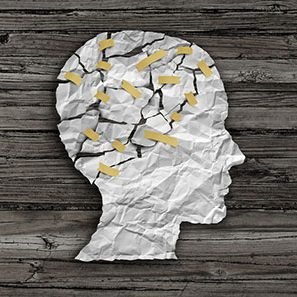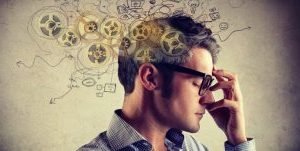
Amnesia is a condition in which a person can no longer memorize or remember information stored in memory. Although it is a popular topic for movies and books, it is a very rare form of discomfort. Being a bit forgetful is completely different from losing memory. Amnesia refers to the loss of large-scale memories that should not be forgotten. These may include important milestones in life, memorable events, key people in life, vital truths that are told or taught.

Amnesia patients have difficulty in remembering the past, memorizing new information and imagining the future. This is to build basic scenarios, recalling the past experiences of patients. The ability to remember events and experiences involves a variety of complex brain processes. When a person gives information to his memory or tries to retrieve information stored in the brain, he may not remember it completely. Most amnesia patients are usually transparent and have a sense of self. However, they may have serious difficulties in learning new information, remembering memories of past experiences, or both.
Amnesia types
There are many different types of amnesia, and the most common types are as follows:
• Anterograde amnesia: The person cannot remember new information, the information that the person has been experiencing recently and that needs to be stored in short term memory is lost, called anterograde amnesia. For example, this can usually result from brain trauma when a person receives a stroke on the head and causes brain damage from it. Therefore, the person remembers the data and events that occurred before the injury.
• Retrograde amnesia : In some ways, unlike anterograde amnesia , one cannot remember events that occurred before traumas, but can remember what happened after that, and this is called retrograde amnesia. Although rare, both retrograde and anterograde amnesia may coexist.
• Transient global amnesia: Transient global amnesia is the temporary loss of all memory and the difficulty in creating new memories in serious situations. It is also very rare and more likely in older adults with vascular disease.
• Traumatic amnesia: Memory loss is caused, for example, by hard knocks in a car accident. The person may experience a brief loss of consciousness or fall into a coma. Amnesia is usually transient, but how long it normally takes may depend on the severity of the injury.
• Wernicke Korsakoff's syndrome:In Wernicke Korsakoff's syndrome, long-term alcohol dependence can cause severe memory loss that worsens over time. In addition, the person may have neurological problems such as poor coordination, loss of sensation in the toes and toes, and may result from malnutrition, particularly a lack of thiamine (vitamin B1).
• Hysteric (fugue or dissociative) amnesia:Rarely, a person can forget not only his / her past but also his / her identity. They can get out of this situation and suddenly they cannot understand who they are. Even if they look in the mirror, they don't recognize their own reflection. Documents such as driving licenses, credit cards or ID cards are meaningless to the person, and often an event is triggered where the person's mind cannot cope properly. This is called hysterical (fugue or dissociative) amnesia. In addition, people with this type of amnesia often have the ability to recall slowly or suddenly within a few days, but the memory of the shocking event may never be fully restored.
• Childhood amnesia: It cannot remember that early childhood events are possible because of a language development problem or some memory regions of the brain that are not fully mature in childhood. This is called childhood amnesia.
• Post hypnotic amnesia: It is called post hypnotic amnesia that is not remembered during the hypnotic events.
• Source amnesia: In this type of amnesia, a person may remember certain information, but not from where or from whom.
• Dimming phenomenon: Consuming large amounts of alcohol may result in memory gaps in which a person does not remember parts of time in a void, which is called a dimming phenomenon.
• Prosop amnesia: People with prosop amnesia cannot remember faces they have seen before. In addition, some people may be congenital or later on.
Amnesia symptoms

Amnesia is a rare condition and has some symptoms. The symptoms of general amnesia can be listed as follows: • In anterograde amnesia, the ability to learn new information is impaired. • Retrograde amnesia deteriorates the ability to recall past events and previously known information. • False memories may occasionally configure a phenomenon in which false memories may occur. • Uncoordinated movements and tremor indicate neurological problems. • Confusion or disorientation may occur. • There may be problems with short-term memory, partial or total memory loss. • The person may not recognize faces or places. Amnesia is different from dementia, because patients with dementia experience memory loss, but they also experience other important cognitive problems that affect their ability to perform daily activities.
Amnesia Reasons
Any illness or injury that affects the brain can affect memory, and the memory function operates many different parts of the brain at the same time. Damage to the brain structures that make up the limbic system such as the hippocampus and thalamus can cause amnesia, and the limbic system controls emotions and memories.Medical Amnesia
Amnesia caused by brain damage or damage. Some of the possible causes of medical amnesia are: • Stroke • Encephalitis and inflammation of the brain due to a bacterial or viral infection or an autoimmune reaction • Celiac disease may be associated with confusion and personality changes. • Oxygen deprivation may occur, for example, as a result of a heart attack, breathing difficulties or carbon monoxide poisoning • Some medications such as sleeping pills • Subarachnoid hemorrhage or bleeding in the area between the skull and the brain • Brain tumor affecting part of the brain • Some seizure disorders • Electroconvulsive therapy (ECT), or shock treatment, psychiatric treatment for therapeutic effect is induced seizures can cause temporary memory loss • head injuries that can lead to memory loss and is usually temporary onesIt Is Good For Your Heart Health Nuts
Psychological Amnesia
Psychological amnesia, also known as dissociative amnesia, is caused by many emotional shock. Some of these emotional shocks are: • A violent crime • Sexual or other abuse • Military warfare • Natural disasters • Terrorist action Unbearable living conditions leading to serious psychological stress and internal conflict can lead to some degree of amnesia. The psychological stressor tends to disrupt personal, historical memories, rather than intervening in revealing new memories.Amnesia Diagnostic

A physician will need to rule out other possible causes of memory loss, such as dementia, Alzheimer's disease, depression, or a brain tumor. A detailed medical history is taken, which may be difficult for the patient to remember, and may include family members or carers. The patient's permission is required to talk to the doctor about his / her medical details. Some questions to ask about the patient's medical details are as follows: • Can the patient remember recent events and events? • When did memory problems begin? • How did it develop? • Are there any factors that cause memory loss, such as head injury, surgery, or stroke? • Is there any neurological or psychiatric condition or family history? • Does the person consume alcohol? • Is he taking any medication? • Has he used illegal drugs such as cocaine or heroin? • Do the symptoms undermine their ability to care for themselves? • Is there a history of depression or seizures? • Have you ever had cancer? A physical examination may check the brain and nervous system, for example: • Reflexes • Sensory function • Balance The doctor may also examine the patient: • Judgment • Short-term memory • Long-term memory Memory assessment helps determine the degree of memory loss, which will help to find the best treatment. The doctor may require an MRI, CAT scan or an electroencephalogram (EEG) to find out if there is any physical damage or brain abnormality. In addition, blood tests can reveal the presence of any infection or nutritional deficiency.
Amnesia Treatment

In most cases, amnesia spontaneously resolves without treatment. However, if there is an underlying physical or mental disorder, treatment may be necessary. Psychotherapy can also help some patients, and hypnosis is an effective way of remembering forgotten memories. In these cases family support is very important and photos, scents and music can help. Treatment usually includes techniques and strategies that help to compensate for the memory problem. Some of these techniques and strategies include: • Working with a professional therapist to obtain new information to replace lost memories, to obtain new memories, and to use existing ones. • Learn strategies for organizing information and facilitate storage. • Helping with daily tasks and identifying important events, when to take medication, and so on. Use digital helpers like smartphones to remind you. A contact list with facial photos can help. There is currently no medication to restore memory lost due to amnesia. Malnutrition or Wernicke-Korsakoff syndrome may include memory loss due to thiamine (vitamin B1) deficiency, so targeted and necessary nutrition may help. In addition, whole grain cereals, legumes (beans and lentils), nuts, lean meat and yeast are rich sources of thiamine.
Bibliography:
sciencedirect.com
ncbi.nlm.nih.gov
memorylossonline.com
journals.lww.com
rarediseases.info.nih.go
jamanetwork.com
Posted from my blog with SteemPress : https://www.orak11.com/index.php/what-is-amnesia-and-how-is-it-treated/
